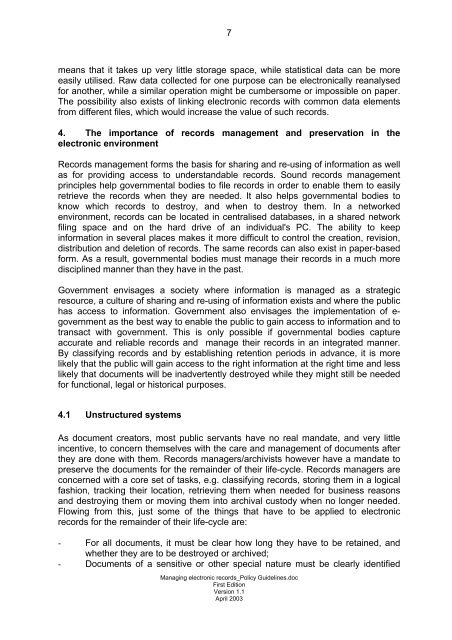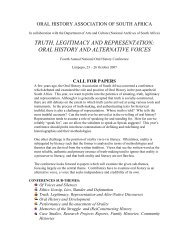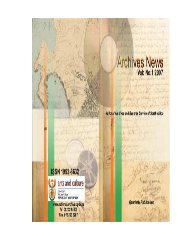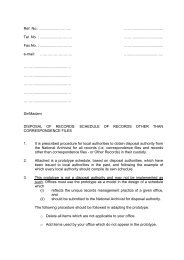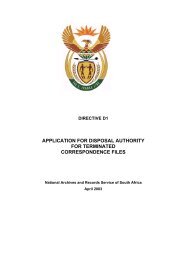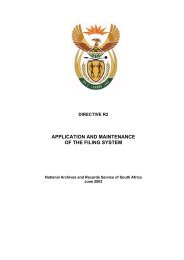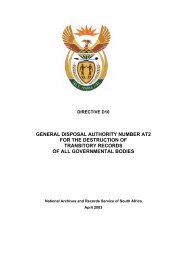managing electronic records in governmental bodies - National ...
managing electronic records in governmental bodies - National ...
managing electronic records in governmental bodies - National ...
Create successful ePaper yourself
Turn your PDF publications into a flip-book with our unique Google optimized e-Paper software.
7<br />
means that it takes up very little storage space, while statistical data can be more<br />
easily utilised. Raw data collected for one purpose can be <strong>electronic</strong>ally reanalysed<br />
for another, while a similar operation might be cumbersome or impossible on paper.<br />
The possibility also exists of l<strong>in</strong>k<strong>in</strong>g <strong>electronic</strong> <strong>records</strong> with common data elements<br />
from different files, which would <strong>in</strong>crease the value of such <strong>records</strong>.<br />
4. The importance of <strong>records</strong> management and preservation <strong>in</strong> the<br />
<strong>electronic</strong> environment<br />
Records management forms the basis for shar<strong>in</strong>g and re-us<strong>in</strong>g of <strong>in</strong>formation as well<br />
as for provid<strong>in</strong>g access to understandable <strong>records</strong>. Sound <strong>records</strong> management<br />
pr<strong>in</strong>ciples help <strong>governmental</strong> <strong>bodies</strong> to file <strong>records</strong> <strong>in</strong> order to enable them to easily<br />
retrieve the <strong>records</strong> when they are needed. It also helps <strong>governmental</strong> <strong>bodies</strong> to<br />
know which <strong>records</strong> to destroy, and when to destroy them. In a networked<br />
environment, <strong>records</strong> can be located <strong>in</strong> centralised databases, <strong>in</strong> a shared network<br />
fil<strong>in</strong>g space and on the hard drive of an <strong>in</strong>dividual's PC. The ability to keep<br />
<strong>in</strong>formation <strong>in</strong> several places makes it more difficult to control the creation, revision,<br />
distribution and deletion of <strong>records</strong>. The same <strong>records</strong> can also exist <strong>in</strong> paper-based<br />
form. As a result, <strong>governmental</strong> <strong>bodies</strong> must manage their <strong>records</strong> <strong>in</strong> a much more<br />
discipl<strong>in</strong>ed manner than they have <strong>in</strong> the past.<br />
Government envisages a society where <strong>in</strong>formation is managed as a strategic<br />
resource, a culture of shar<strong>in</strong>g and re-us<strong>in</strong>g of <strong>in</strong>formation exists and where the public<br />
has access to <strong>in</strong>formation. Government also envisages the implementation of e-<br />
government as the best way to enable the public to ga<strong>in</strong> access to <strong>in</strong>formation and to<br />
transact with government. This is only possible if <strong>governmental</strong> <strong>bodies</strong> capture<br />
accurate and reliable <strong>records</strong> and manage their <strong>records</strong> <strong>in</strong> an <strong>in</strong>tegrated manner.<br />
By classify<strong>in</strong>g <strong>records</strong> and by establish<strong>in</strong>g retention periods <strong>in</strong> advance, it is more<br />
likely that the public will ga<strong>in</strong> access to the right <strong>in</strong>formation at the right time and less<br />
likely that documents will be <strong>in</strong>advertently destroyed while they might still be needed<br />
for functional, legal or historical purposes.<br />
4.1 Unstructured systems<br />
As document creators, most public servants have no real mandate, and very little<br />
<strong>in</strong>centive, to concern themselves with the care and management of documents after<br />
they are done with them. Records managers/archivists however have a mandate to<br />
preserve the documents for the rema<strong>in</strong>der of their life-cycle. Records managers are<br />
concerned with a core set of tasks, e.g. classify<strong>in</strong>g <strong>records</strong>, stor<strong>in</strong>g them <strong>in</strong> a logical<br />
fashion, track<strong>in</strong>g their location, retriev<strong>in</strong>g them when needed for bus<strong>in</strong>ess reasons<br />
and destroy<strong>in</strong>g them or mov<strong>in</strong>g them <strong>in</strong>to archival custody when no longer needed.<br />
Flow<strong>in</strong>g from this, just some of the th<strong>in</strong>gs that have to be applied to <strong>electronic</strong><br />
<strong>records</strong> for the rema<strong>in</strong>der of their life-cycle are:<br />
- For all documents, it must be clear how long they have to be reta<strong>in</strong>ed, and<br />
whether they are to be destroyed or archived;<br />
- Documents of a sensitive or other special nature must be clearly identified<br />
Manag<strong>in</strong>g <strong>electronic</strong> <strong>records</strong>_Policy Guidel<strong>in</strong>es.doc<br />
First Edition<br />
Version 1.1<br />
April 2003


